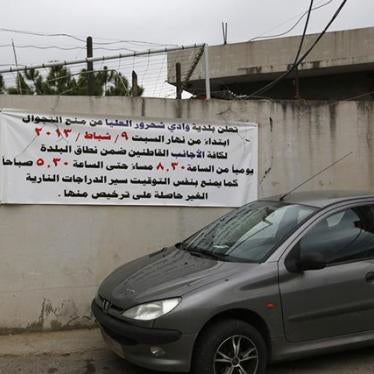(Beirut) – The deteriorating security situation is having a negative effect on human rights protections in Lebanon, Human Rights Watch said today in its World Report 2015. The government has adopted broad restrictions on Syrian refugees, and security forces have committed abuses during security operations.
As of November 2014, more than 1.1 million Syrian refugees were in Lebanon. With limited international support, the government has struggled to meet the refugees’ needs and has tried to limit the numbers of Syrians, including by preventing some refugees from entering Lebanon. Following clashes between extremist militants based in Syria and the Lebanese army in August, Syrian refugees suffered from increasing retaliatory measures including municipal curfews, forced evictions, and violence by private parties, with little response by Lebanese authorities.
“As security challenges in Lebanon mount, so do concerns about the government failing to adequately protect human rights,” said Nadim Houry, deputy Middle East and North Africa director. “Protecting the rights of both the Lebanese and of Syrian refugees is not only the right thing to do, it is the best way to ease the tensions in the country.”
In the 656-page world report, its 25th edition, Human Rights Watch reviews human rights practices in more than 90 countries. In his introductory essay, Executive Director Kenneth Roth urges governments to recognize that human rights offer an effective moral guide in turbulent times, and that violating rights can spark or aggravate serious security challenges. The short-term gains of undermining core values of freedom and non-discrimination are rarely worth the long-term price.
Multiple shelling attacks into Lebanon from Syria during 2014 affected north Lebanon and the Bekaa Valley. There were 14 car bombings or suicide bomb attacks, at least 5 of which targeted civilians. There were several rounds of clashes between local militias and involving Lebanese security personnel in the northern city of Tripoli.
Some suspects in the car bombings and other attacks have been held in lengthy pretrial detention and have alleged ill-treatment or torture. Over two dozen people the army detained in security raids told Human Rights Watch that security forces had tortured them including with whips, batons, sticks, and electricity.
On October 2, the UN Committee against Torture issued a report that concluded that torture in Lebanon is a “pervasive practice that is routinely used by the armed forces and law enforcement agencies.”
Lebanon should establish a national preventive mechanism to visit and monitor detention facilities, as required under the Optional Protocol to the Convention against Torture (OPCAT), which it ratified in 2008, Human Rights Watch said. Reports of abuse should be investigated and those responsible held to account.
There were clashes between militants based in Syria, including from the extremist group Islamic State (also known as ISIS) and Jabhat al-Nusra, and the Lebanese army in August. Residents said that soldiers refused to allow Syrians to flee during the fighting and that indiscriminate firing, including by the army, hit civilian targets. Armed groups reportedly took as many as 35 Lebanese security personnel hostage, and have executed four of them.
International donors to the Lebanese Armed Forces and Internal Security Forces, including the United States, the United Kingdom, and the European Union, should encourage these units to comply with international human rights law and promote independent accountability mechanisms, Human Rights Watch said. Donor countries should continue to generously support humanitarian efforts for refugees while supporting local populations.







